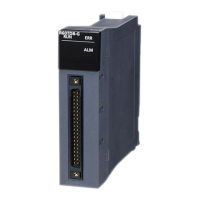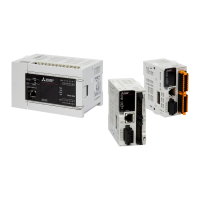1744
21 A/D CONVERSION INSTRUCTIONS
21.2 Reading the User Range Setting Values
• These instructions read the offset/gain setting values of the user range settings of an analog module into the CPU module.
• Execution and normal/error completion of the G(P).OGLOAD instruction can be checked with the completion device
specified by the setting data (d) and the completion status indication device (d)+1.
• The following figure shows how the G(P).OGLOAD instruction operates when completing its execution.
■Program example
The following figure shows an example of a program which uses the G(P).OGLOAD instruction with the R60AD4.
• Program content
• Label setting
• Completion device (d)
Turns on during END processing of the scan that arises upon completion of the G(P).OGLOAD instruction, and turns off during the next END processing.
• Completion status indication device (d)+1
Turns on or off depending on the status resulting from completion of the G(P).OGLOAD instruction.
When completed normally: Unchanged from off.
When completed with an error: Turns on during END processing of the scan that arises upon completion of the G(P).OGLOAD instruction, and turns off during
the next END processing.
Description
When "Dedicated Instruction Execution Request" (M11) is turned on, the offset/gain settings of the analog module mounted at the position of I/O numbers X/
Y10 to X/Y1F are read out to the "head device (D100) for storing the offset gain setting" and later.
Classification Label name Description Device
Module label
Label to be defined Define the global label as shown below.
END0END0END0END0END0
OFF
OFF
OFF
OFF
ON
ON
Sequence scan
G.OGLOAD instruction
Completion device (d)
Completion status
indication device (d)+1
Completed with an error
Execution of
the instruction
Completed successfully
1 scan
Completion of the instruction

